Russian politician Dmitry Medvedev recently warned of a potential nuclear war as a result of provocations by Ukraine and its allies, blaming the “neo-Nazi” regime in Kyiv and its Western supporters for pushing the world towards catastrophe. He highlighted the increased tensions between Russia and Ukraine, with reports indicating that restrictions on Ukraine’s use of Western weapons would soon be lifted. This statement came amid Russian President Vladimir Putin’s announcement that Russia would review the conditions under which it might use its nuclear arsenal, considering any aggression against Russia by a non-nuclear state supported by a nuclear state as a potential trigger for a nuclear response. This policy update would also extend to Belarus, an ally of Moscow, with any attack on the country viewed as a provocation against Russia.
Medvedev’s comments align with those made by Putin, who emphasized the need for a strong nuclear deterrent against potential threats from non-nuclear states backed by nuclear powers. The criteria for a nuclear response would include significant attacks on Russian territory by missiles, aircraft, or drones, aiming to deter opponents who may not prioritize self-preservation. Belarus is also included under Russia’s nuclear umbrella, with any aggression against the country considered a direct provocation against Moscow. These statements underscore the seriousness of the situation and the high stakes involved in the ongoing conflict between Russia and Ukraine.
The backdrop for these warnings is Ukraine’s ongoing efforts to secure permission to use long-range Western weapons against Russian military targets, a move that Moscow strongly opposes. Ukrainian President Volodymyr Zelensky’s visit to the U.S. includes discussions on this issue, with the goal of gaining support for deploying these weapons to counter Russian advances. Zelensky is expected to unveil his “Victory Plan” for the conflict during his meeting with President Joe Biden, indicating the importance of international cooperation in addressing the crisis. However, Russia’s objections to such actions highlight the potential for escalation and retaliation against Ukraine’s allies if they support these decisions, further complicating the situation.
The prospect of a nuclear conflict between Russia and Ukraine, fueled by geopolitical tensions and military escalation, raises concerns about the potential consequences for global security and stability. The underlying dynamics of the conflict, including competing interests, alliances, and strategic calculations, contribute to the volatile nature of the situation. As negotiations and discussions continue among key stakeholders, including the U.S., European countries, Russia, and Ukraine, the need for de-escalation and diplomatic solutions becomes increasingly urgent. The risk of unintended consequences and the specter of nuclear warfare underscore the imperative of finding peaceful resolutions and preventing further escalation in the region.
The evolving deterrence policy outlined by Medvedev and Putin reflects Russia’s efforts to assert its military capabilities and defend its interests in the face of perceived threats from Ukraine and its allies. The inclusion of Belarus within Russia’s nuclear umbrella further complicates the regional security landscape and underscores the interconnected nature of conflicts in the region. As tensions continue to mount and the risk of military confrontation grows, the international community faces a critical challenge in navigating the complexities of the situation and preventing a wider conflict with potentially catastrophic consequences. The need for dialogue, diplomacy, and cooperation in addressing the root causes of the conflict has never been more pressing, as the specter of a nuclear war looms over the region.








